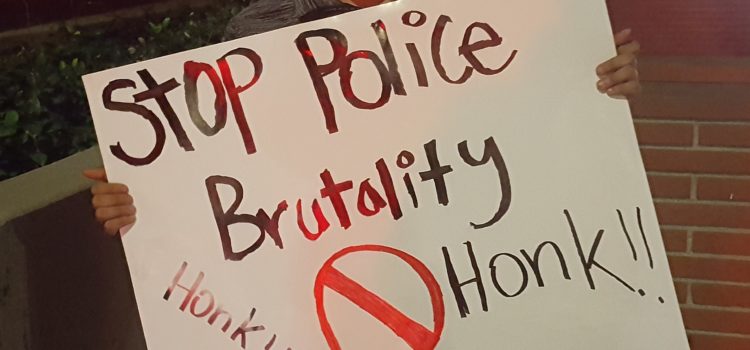
South Kern Sol, News Report, Dean Welliver
The day before ACLU released a report detailing civil rights infractions by local Bakersfield law enforcement, a peaceful die-in was held to demand police accountability. That was after an officer-involved shooting took the life of a 20-year-old man.
The die-in, organized in the days following the fatal officer-involved shooting of Augustus Joshua Crawford, 20, in South Bakersfield, was held on the steps of police headquarters.
According to the Bakersfield Police Department, on Nov. 4, Bakersfield Police Chief Lyle Martin’s son, Officer Warren Martin, wounded Crawford, who died later that night as a result of his injuries. Police officials said Officer Warren Martin was placed on administrative leave.
Protesters said they had a clear message for their planned Nov. 7 die-in: they demand stronger police accountability as well as Bakersfield Police Department officers equipped with body cameras controlled by an independent entity.
The protest began with a rally at the Liberty Bell in Downtown Bakersfield. Protesters marched from there to Bakersfield Police Department headquarters to stage their die-in.
At BPD headquarters, protesters positioned themselves on the sidewalks and steps to represent local police brutality victims. Bakersfield High School student Larissa Montijo, 15, described how incorporating art and theatrics into the die-in was important in getting the protesters’ message across. “Art can show exactly what we’re doing here, why we are doing it, and can express our feelings,” she said.
Montijo also shared her fears of police profiling. “I don’t know what could be going through their head,” she said, adding, “if it’s my [skin] color, if it’s the way that I’m dressed. I don’t feel comfortable with it.”
Gabriel Estrella, a fifteen-year-old student at Bakersfield High School, said,“I think that could be me. It’s important to [protest] because a lot of police treat younger people horribly. They don’t think that we are going to speak about it because we are young. That’s why I’m out here doing what I am doing.”
Jeanette Limones, the protest’s lead organizer, highlighted the importance of having independently controlled body cameras. “I feel like the trust is gone.” she said, noting internal police investigations in recent years. “They’ve been under investigations. They’ve shown a practice of investigating themselves.” She said it’s sad that police can’t always be trusted. “It’s their word against someone who is no longer with us.”
The Bakersfield Police Department launched an investigation this summer of officer misconduct after Tatyana Hargrove, 19, was mistaken by police officers as a much larger and bald machete-wielding adult male suspect. In the June 18 incident, officers beat Hargrove and attacked her with K-9s. Police department officials changed their stance after initially ruling that officers employed an appropriate amount of force on the petite teen.
Limones also discussed the need for body cameras, suggesting how technology can be the voice of someone like Crawford killed in the early November officer-involved shooting. “Body cameras would help that process move along, give us closure, and [help citizens] feel secure that we will have justice.”
Montijo said body cameras would contribute to repairing trust and accountability between community and police officers. “I think knowing that other people will see what is going on between us would be comforting, and letting people know that it’s on camera, so if something happened there would be evidence.”
Limones said she realizes that body cameras could exonerate officers after controversial officer-involved deaths. “Maybe they were in a situation where they felt threatened and they had reason but we don’t know that.”
In the meantime, Limones said she will continue her advocacy efforts to stop police brutality. She has reached out to the Kern County Sheriff’s Office after it was awarded a grant last month that will fund body cameras for 90 more deputies. She has yet to hear back, but Mayor Goh contacted Limones, telling her the City Council is considering the implementation of body cameras for its police officers.
“I am confident that we will get them especially after Sheriff Youngblood was advocating for body cameras,” Limones said. “The fight now is to see who will be in charge of who controls the cameras and the footage. It should be an independent entity. I am confident we will win this because now supportive data is coming out. We will continue to fight for more training.”
The report, released by ACLU of California this past Wednesday detailed the findings of a two-year investigation of the Bakersfield Police Department and the Kern County Sheriff’s Office. The report found that the BPD and KCSO have patterns of behavior that violate civil rights, use excessive force, and retaliate against victims of their excessive force. The ACLU highlighted that a lack of oversight and accountability infrastructure has enabled these practices and patterns to continue to occur and escalate.
The Bakersfield Police Department did not respond to South Kern Sol’s inquiry for comment.